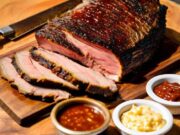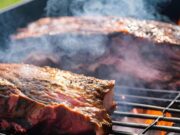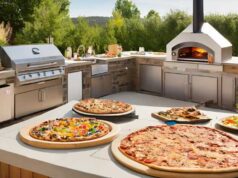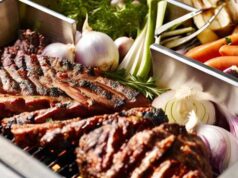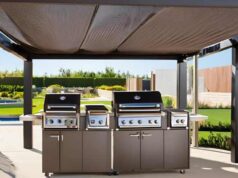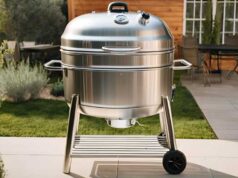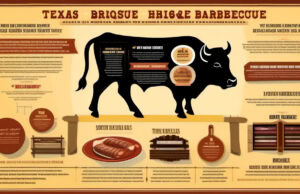- Key Takeaways:
- Understanding Gas and Charcoal Grills
- Pros and Cons of Charcoal Grills
- Pros and Cons of Gas Grills
- Flavor Profile: Gas vs. Charcoal
- Ease of Use and Cooking Convenience
- Health and Environmental Considerations
- Cost Comparison: Initial Investment and Maintenance
- Frequently Asked Questions
When considering outdoor cooking, choosing between gas and charcoal grills often leads to a spirited debate among enthusiasts. Each option presents distinct advantages and drawbacks that can influence both the grilling experience and the flavor of your food.
This exploration will delve into the unique flavor profiles and ease of use associated with gas and charcoal grills, while also addressing health implications, environmental impacts, and cost considerations.
By the conclusion, you will gain a clearer understanding of which grill aligns best with your cooking style and preferences.
Key Takeaways:
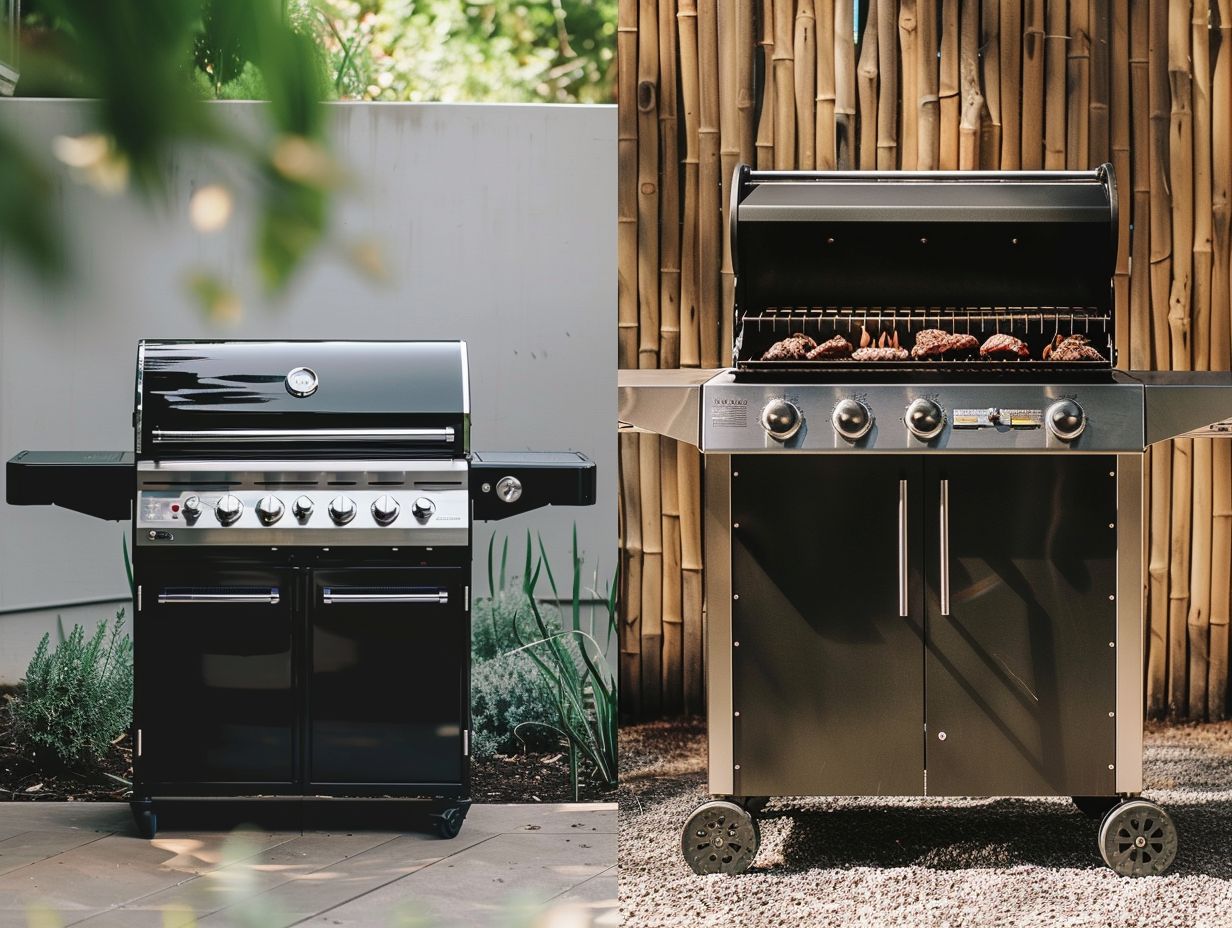
- Gas grills offer convenience and ease of use, while charcoal grills provide a more authentic flavor profile.
- When it comes to health and environmental considerations, gas grills are a more eco-friendly option.
- The initial investment and maintenance costs of gas grills may be higher, but they offer more long-term savings compared to charcoal grills.
Understanding Gas and Charcoal Grills
Gas and charcoal grills each offer distinct features that cater to various cooking styles and preferences.
For those who appreciate the convenience of gas grilling, the setup generally involves connecting a propane tank and igniting the burners with a simple push of a button. This user-friendly approach allows for quick adjustments to temperature via knobs, enabling you to sear steaks or create indirect cooking zones for larger cuts.
Conversely, charcoal grills invite enthusiasts to engage in the art of achieving the perfect coal bed, which imparts that quintessential charred flavor. By utilizing accessories such as chimneys for efficient lighting and heat-resistant gloves for safe handling, you can enhance your culinary creations while ensuring safety.
These two types of grills not only differ in functionality but also provide unique flavor profiles that can transform any outdoor gathering into an unforgettable feast.
Pros and Cons of Charcoal Grills
Charcoal grills provide a culinary experience rich in tradition, highly valued by grilling enthusiasts for their ability to impart a robust, smoky flavor to a variety of foods, including steaks, burgers, and ribs. While they deliver a distinct taste and can reach high temperatures ideal for searing, using charcoal grills typically requires more time and effort in terms of preparation, maintenance, and cleanup compared to gas grills.
One significant advantage of charcoal grilling is the ability to achieve intense heat, which is perfect for creating those coveted grill marks and sealing in moisture within the meat. This unique cooking environment enhances dishes with a rich, charred flavor that is difficult to replicate.
However, you must take into account the longer preparation time and the need for charcoal briquettes, which may take some time to ignite and reach the desired cooking temperature. The post-cooking cleanup often involves managing ash disposal and grease buildup, prompting some to prefer the convenience of gas grills.
For those who prioritize flavor and are willing to invest the additional effort, the rewards of charcoal grilling can be truly exceptional. Find out more about the differences between gas and charcoal grills here.
Pros and Cons of Gas Grills
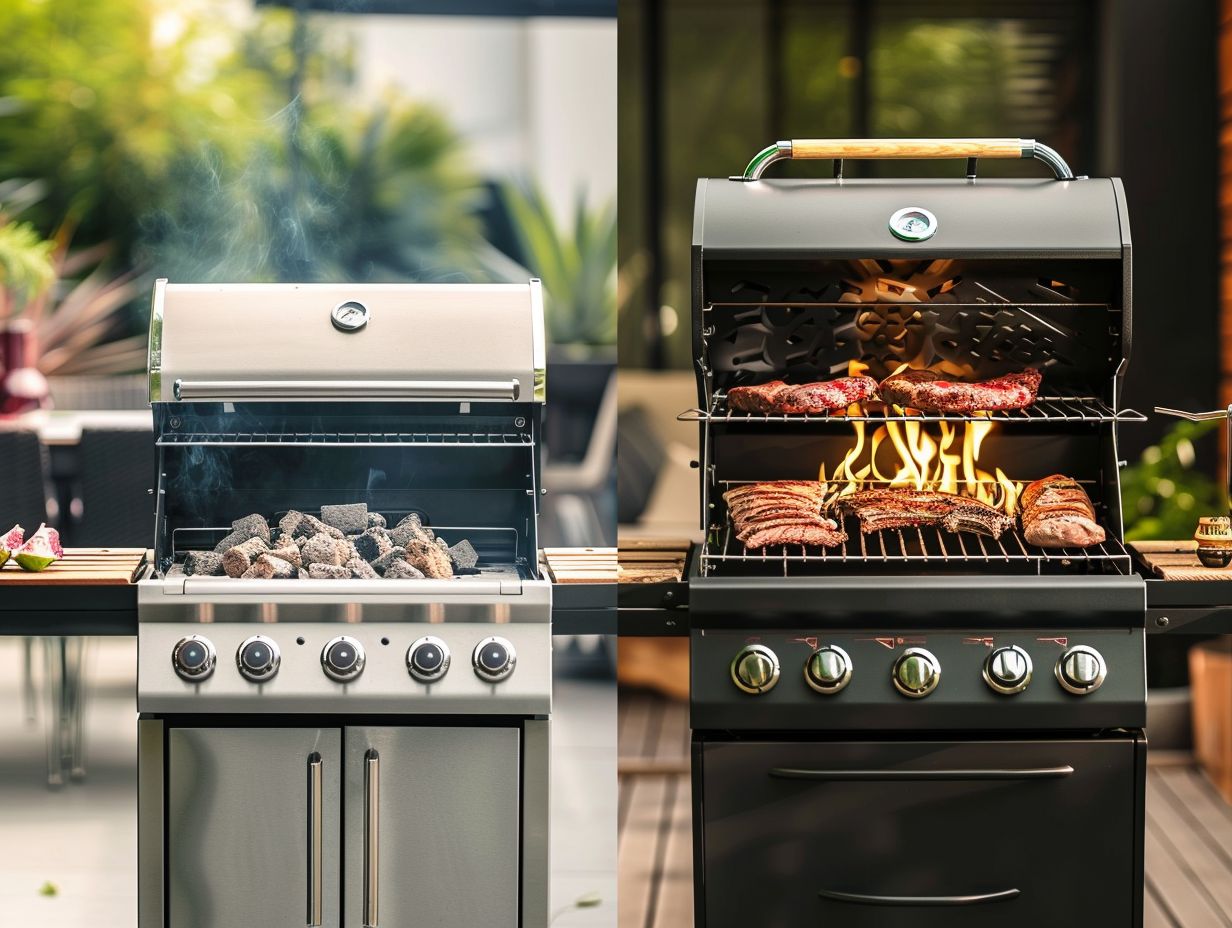
Gas grills, such as the popular Weber Spirit II E-310, are engineered for convenience and efficiency, making them an attractive option for both novice and experienced grillers. With features that allow for easy ignition, precise heat control, and faster cooking times, gas grills enable you to enjoy grilled food without the lengthy preparation often associated with charcoal grilling. However, it is important to note that they may not provide the same depth of smoky flavor that charcoal enthusiasts appreciate.
This convenience is further enhanced by the minimal cleanup required after cooking; you won’t have to deal with ash disposal or extensive fire management. You can quickly wrap up your grilling and enjoy quality time with family without the burden of extensive post-cooking maintenance.
While the initial investment in a gas grill might be higher compared to a traditional charcoal setup, many find that the time savings and ease of use make it a worthwhile purchase. It is essential to consider these advantages alongside potential downsides, such as the less intense flavor profile, when determining which grill best meets your needs.
Flavor Profile: Gas vs. Charcoal
The flavor profiles produced by gas and charcoal grills are distinctly different, arising from their unique cooking methods and fuel sources. Charcoal grills are renowned for their ability to impart a rich, smoky flavor that enhances meats like brisket and ribs, creating the aromatic barbecue essence that many grilling enthusiasts appreciate. In contrast, gas grills tend to deliver a cleaner taste, allowing the natural flavors of the food to shine through, although this often comes with less complexity compared to charcoal cooking.
When you grill with charcoal, the smoke interacts with the fat and juices of the meat, resulting in a complex layering of flavors that can elevate an ordinary barbecue into a truly flavorful feast. The high heat of charcoal grills facilitates a perfect sear, locking in moisture while providing those desirable grill marks that not only enhance visual appeal but also contribute texture.
On the other hand, gas grills excel with their precise temperature control and quick startup, making them ideal for even cooking across a variety of foods, including vegetables that retain their vibrant colors and crunch. The versatility of cooking techniques—such as direct versus indirect heat on both types of grills—further enhances the transformation of different meats and vegetables, ensuring that every grilling experience is unique.
Ultimately, the choice between gas and charcoal extends beyond mere convenience; it encompasses the sensory journey offered by the nuances of flavor.
Ease of Use and Cooking Convenience
In the realm of outdoor cooking, ease of use and convenience are pivotal factors in your decision between gas and charcoal grills. Gas grills excel in straightforward operation, featuring quick ignition and simple temperature control, making them ideal for impromptu dinners or summer barbecues. On the other hand, charcoal grills necessitate additional steps for preparation and temperature management, which may detract from your overall grilling enjoyment.
Gas grills typically include electronic igniters that provide almost instantaneous lighting, eliminating the waiting time associated with traditional charcoal methods. Once lit, these grills offer adjustable knobs that allow for precise temperature regulation, ensuring that your meats are cooked to perfection.
Conversely, while charcoal grills are cherished for their authentic smoky flavor, they require you to monitor the burning coals and adjust airflow to maintain the desired heat level. For those who find joy in the grilling process, the tactile experience of managing charcoal can add a rewarding element. However, for many, the simplicity and efficiency of gas grilling often result in a more enjoyable and stress-free outdoor cooking experience.
Health and Environmental Considerations
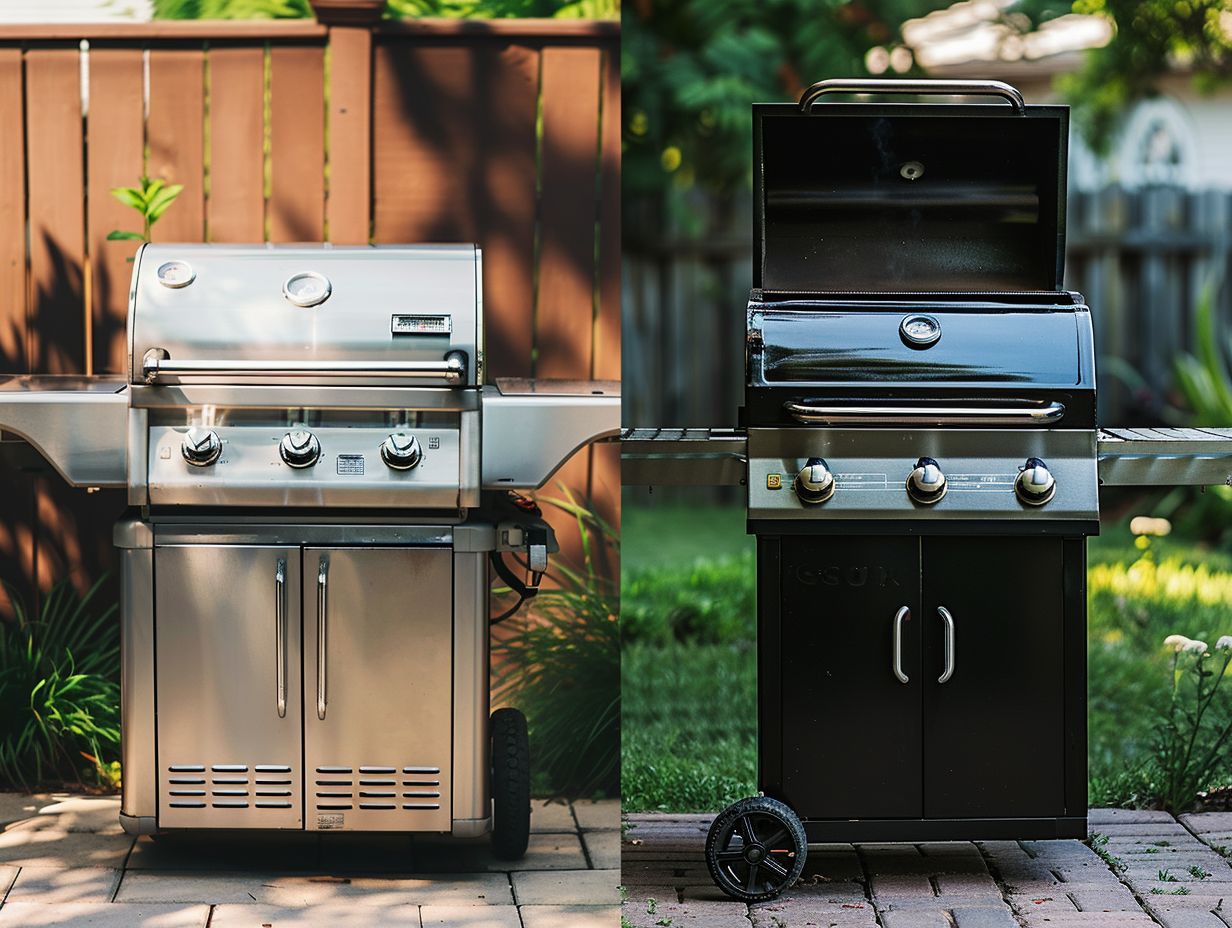
When deciding between gas and charcoal grills, it is important to consider health and environmental factors that may influence your choice. Gas grills are often regarded as the more environmentally friendly option due to their lower emissions and cleaner-burning fuel. In contrast, while charcoal grills have a nostalgic appeal, they can produce higher levels of soot and require careful cleanup to minimize their environmental impact.
Safety concerns associated with each type of grill should also be taken into account. Gas grills can present risks if there are leaks or if they are not properly maintained, potentially leading to hazardous situations. On the other hand, charcoal grilling can release harmful particulates into the air, contributing to pollution and adversely affecting air quality, which has implications for public health.
As you evaluate these options, it is essential to weigh the immediate culinary experience against potential long-term environmental repercussions. This consideration encourages you to think not only about flavor but also about sustainable practices in outdoor cooking.
Cost Comparison: Initial Investment and Maintenance
Understanding the cost dynamics of gas and charcoal grills is essential for consumers who aim to enhance their grilling experience while managing expenses effectively. Although the initial investment in a gas grill may be substantial, particularly with reputable brands like Royal Gourmet or Weber, the long-term maintenance costs are generally lower compared to charcoal grills. Charcoal grills necessitate ongoing purchases of charcoal briquettes and related grilling tools.
Gas grills often come equipped with features that minimize the need for additional purchases. For instance, many models include built-in side burners or integrated thermometers, which can significantly enhance the overall cooking experience.
On the other hand, charcoal grills typically require more frequent purchases of charcoal and lighter fluids, as well as other accessories such as chimney starters and grill cleaning tools. These costs can accumulate and become a considerable expense over time.
By carefully considering these factors, grill enthusiasts can make informed decisions that align with their budget and grilling preferences, ultimately leading to a more enjoyable outdoor cooking experience.
Frequently Asked Questions
What are the main differences between gas and charcoal grills?
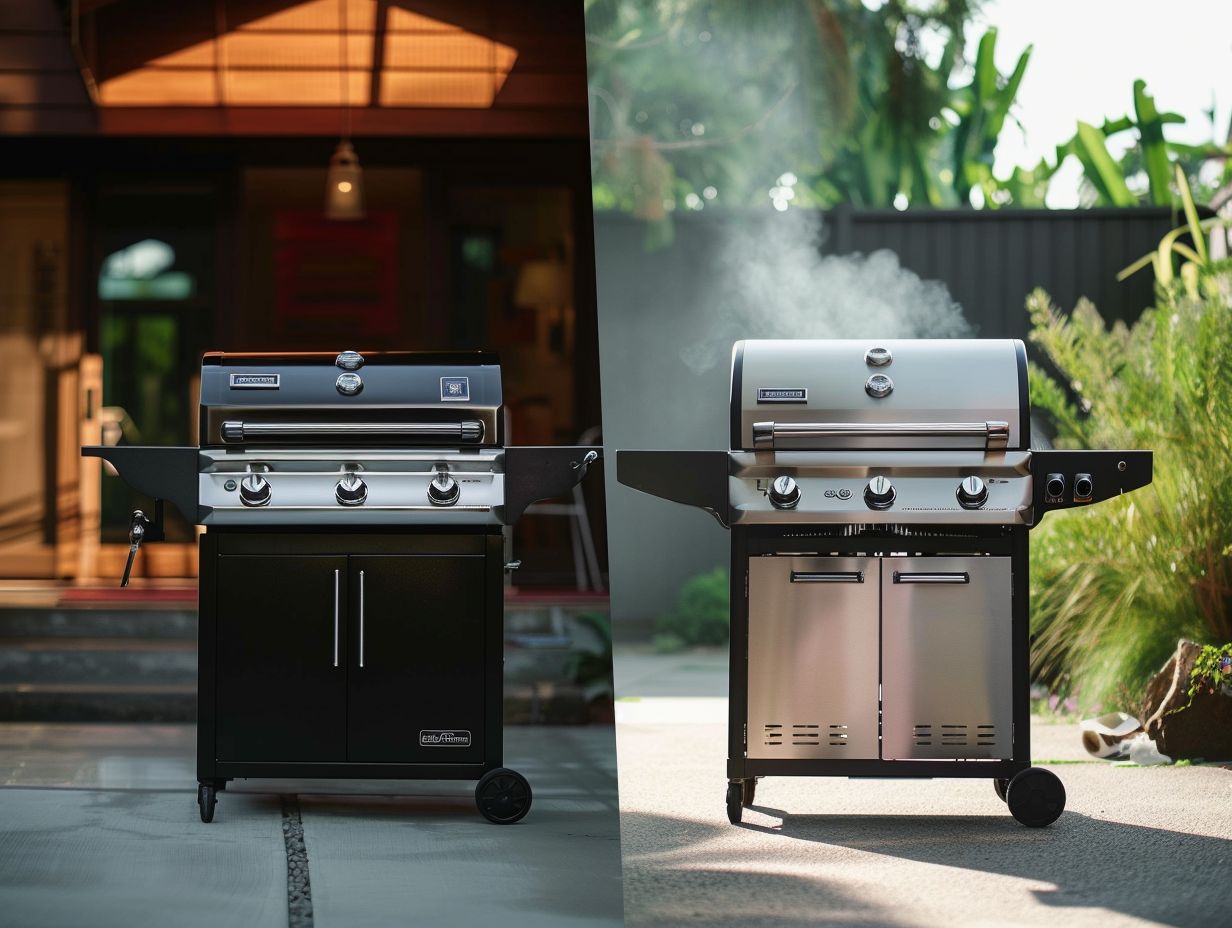
Gas grills use propane or natural gas as a fuel source, while charcoal grills use charcoal briquettes or lump charcoal. Gas grills also usually have a push-button ignition and temperature control knobs, while charcoal grills require manual lighting and adjusting of charcoal placement for temperature control.
Which type of grill is easier to use and maintain?
Gas grills are generally easier to use and maintain, as they have a simpler ignition and temperature control system. They also tend to have fewer ashes and debris to clean up after cooking.
Do gas grills or charcoal grills provide better flavor?
Many people believe that charcoal grills provide better flavor due to the smoky taste from the burning charcoal. However, some gas grills also have features like wood chip trays that can add flavor to the food.
Are gas or charcoal grills more cost-effective?
In the long run, gas grills may be more cost-effective as they don’t require regular purchases of charcoal. However, charcoal grills may be cheaper initially and may use less energy overall.
What type of cooking is best for gas and charcoal grills?
Gas grills are better for quick, high-heat cooking, while charcoal grills are better for low and slow cooking. Charcoal grills are also great for smoking and imparting a smoky flavor to food.
Which type of grill is better for outdoor use?
Both gas and charcoal grills are suitable for outdoor use, but gas grills may be more convenient for certain outdoor settings, such as camping or tailgating, due to their portability and ease of use.

















